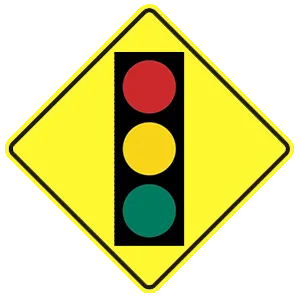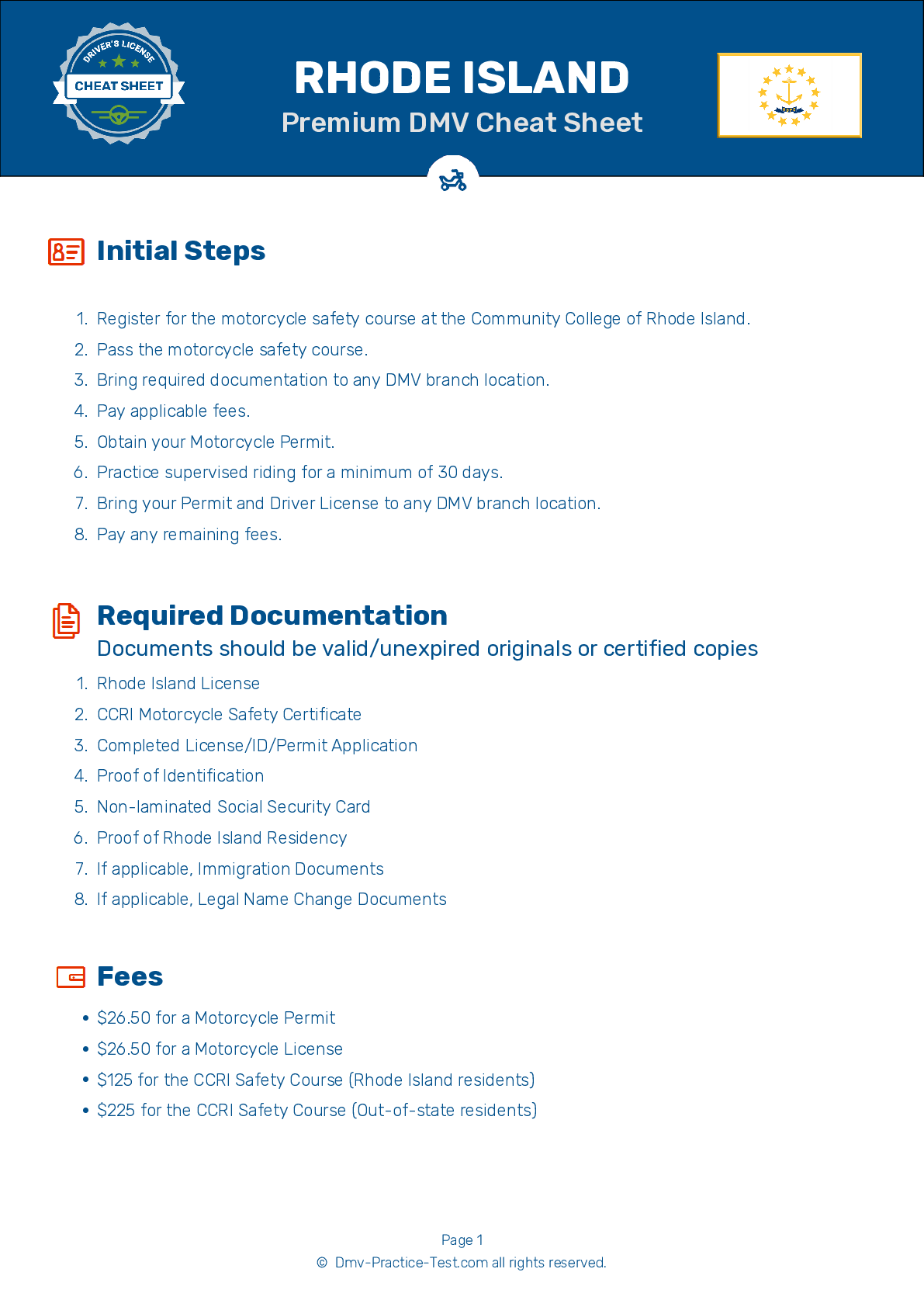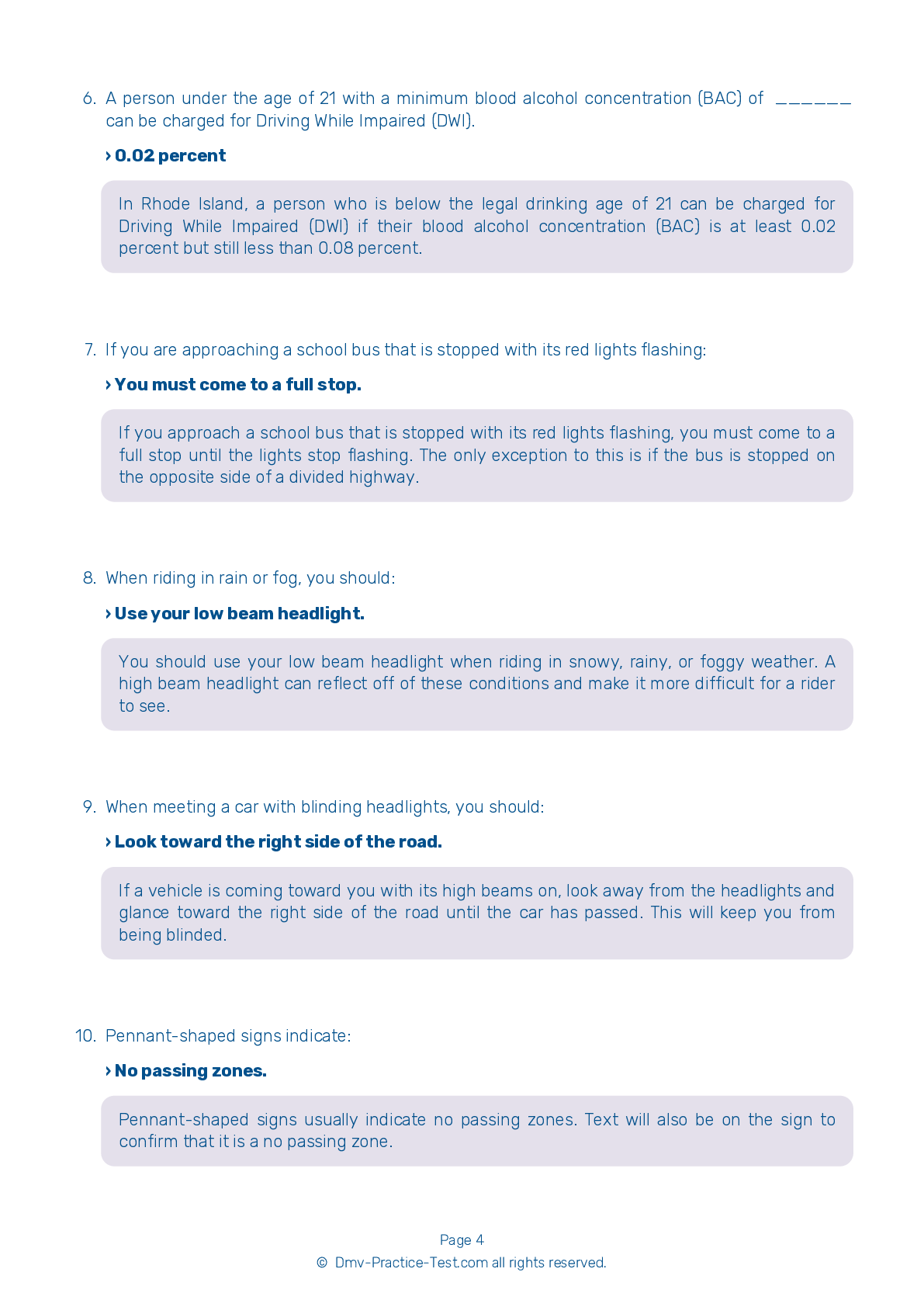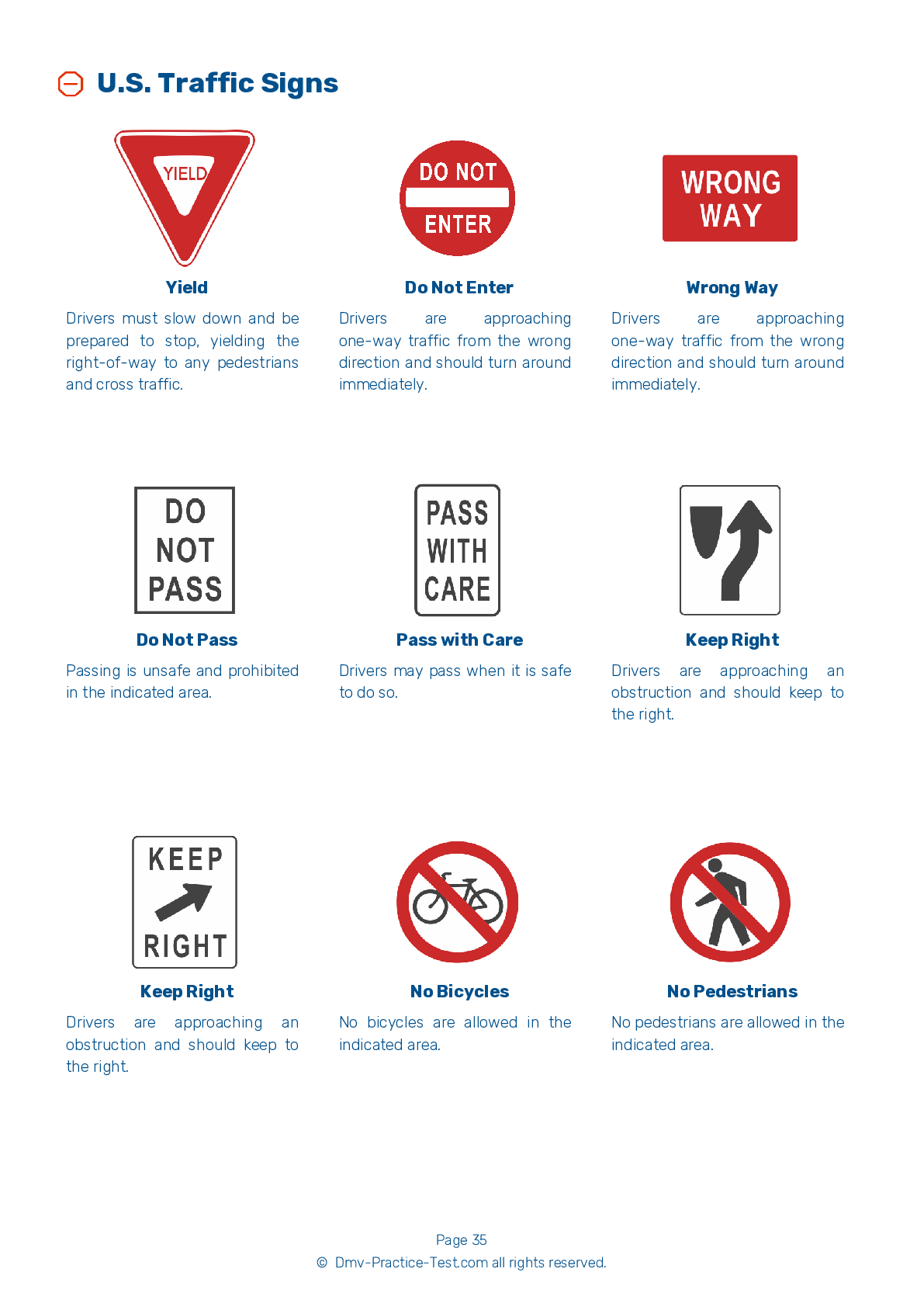DMV Permit Test #9
Motorcycle Test | License RI 2026 | FREE Online Practice! #9 Page 4 of 4
Take this FREE motorcycle test (license in RI 2026) to check your knowledge of the road rules. To improve your results, download a motorcycle handbook online, study theory, and practice for free on our website. Still worried about how to get a motorcycle license in Rhode Island in 2026? Check our website for more sample tests, train as much as possible, and boost your grades!
25
20
16
20 . Most crashes happen:
On long trips.
Most motorcycle crashes happen on trips that are shorter than five miles in length at speeds slower than 30 mph.
21 . If a friend has been drinking alcohol and wants to drive, which of the following should you not do?
Slow their pace of drinking.
There are several strategies you can use to prevent someone from driving while under the influence of alcohol. You can arrange another way for them to get home, involve them in other activities to slow their pace of drinking, use any available excuse to stop them from leaving before they are sober, and get other friends involved to intervene as a group.
22 . When carrying a passenger or cargo:
It may take less time to accelerate and stop.
Because of the additional weight added by cargo or a passenger, motorcycles may take longer to accelerate and stop than they would if only transporting the operator.
23 . Goggles will:
Provide protection for your entire face.
Wearing goggles provides protection for your eyes, but not for the rest of your face. A face shield provides protection for your whole face and is recommended above goggles. A windshield is not an adequate substitute for a face shield or goggles.
24 . The primary source of information about your motorcycle should come from:
A motorcycle enthusiast.
The owner's manual should be your primary source of information about your specific type of motorcycle. Be sure to read the manual before operating your motorcycle for the first time.
25 . On a slippery surface, you should not:
Use both brakes when slowing or stopping.
To ride safely on a slippery surface, you should use both brakes when slowing or stopping, reduce your speed, and avoid making sudden moves. Be alert to oily areas, dirt, gravel, shaded areas, and bridges, as these surfaces are more likely to be slippery than others.
Search the best driving school in your neighbourhood
2026 Rhode Island | Frequently Asked Questions
To acquire a motorcycle driver's license in Rhode Island, you must first apply for a motorcycle learner's permit at the DMV. After holding the permit for 30 days, you can take the skills test. If you pass, you'll be issued a motorcycle license. For those under 21, completion of a motorcycle training course is mandatory before taking the skills test.
In Rhode Island, the minimum age to obtain a motorcycle driver's license is 16 years old. However, applicants under 18 years old must complete a state-approved motorcycle safety course. They also need parental consent and must hold a motorcycle permit for at least 30 days before taking the motorcycle road test.
Yes, you need a dedicated license to ride a motorcycle in Rhode Island. You can get a motorcycle endorsement on your current driver's license or apply for a separate motorcycle license. Both require passing a written test and a skills test. If you successfully complete an approved motorcycle training course, these tests may be waived.
To apply for a motorcycle driver's license in Rhode Island, you'll need several documents. These include proof of identity (like a birth certificate or passport), proof of Social Security number, and proof of Rhode Island residency. If you're under 18, you'll also need a Certificate of Parental Consent. Additionally, if you've completed a motorcycle training course, bring the completion certificate.
Yes, you will need to take a written exam to get a motorcycle license in Rhode Island. The written test covers motorcycle operation, safety rules, and Rhode Island traffic laws. If you successfully complete a state-approved motorcycle training course, you may be eligible to waive this written test.
The motorcycle written test in Rhode Island covers various subjects related to motorcycle safety and operation. Topics include road signs and signals, traffic laws, safe riding practices, handling emergencies, and motorcycle maintenance. The questions are designed to ensure you have the knowledge necessary to operate a motorcycle safely on public roads.
Yes, in Rhode Island, you can substitute the written test with a motorcycle training course. By successfully completing an approved motorcycle training course, you can bypass the written and on-cycle skills tests at the DMV. The course provides both classroom instruction and practical hands-on training, ensuring you're well-prepared for safe riding.
To enroll in a motorcycle training course in Rhode Island, you need to find a state-approved provider. Once you've chosen a provider, you can register for the course online or in person. Registration often requires payment upfront. The course will include both classroom instruction and practical training. Upon completion, you may be eligible for a waiver for the state's motorcycle license test.
No, you don't need to own a motorcycle for the license test in Rhode Island. You can use any motorcycle that is registered, insured, and meets all safety requirements. However, you should be comfortable riding it since you'll need to demonstrate your ability to control and handle it safely during the test.
Yes, you can use a friend's motorcycle for the driver's license evaluation in Rhode Island. The motorcycle must be registered, insured, and meet all safety requirements. Be sure you're comfortable riding it, as you'll need to demonstrate control and safe handling during the test. Always wear a helmet and protective gear during the evaluation.
Yes, in Rhode Island, the motorcycle driving exam tests specific handling skills. These include the ability to start and stop, turn and swerve, accelerate and decelerate smoothly, and balance the motorcycle. Also tested is the rider's understanding of Rhode Island traffic laws, ability to recognize and react to hazards, and basic knowledge of motorcycle operation.
Yes, Rhode Island imposes limitations on new motorcycle drivers. If you're under 21, you must complete a motorcycle training course. New drivers are also required to hold a motorcycle learner's permit for at least 30 days before taking the skills test for a license. Always check with the Rhode Island DMV for the most current rules and regulations.
Yes, your Rhode Island motorcycle license permits you to ride a motorcycle in other states. It's important to note, however, that you must abide by the traffic laws of the state you are in. Some states may have different motorcycle laws and regulations, so it's advisable to familiarize yourself with these before traveling.
Yes, in Rhode Island, it is mandatory for all motorcycle operators and passengers to wear a helmet. This law is in place to ensure the safety of all individuals involved. Helmets must meet the standards set by the Federal Motor Vehicle Safety Standard 218.
In Rhode Island, there's a single type of motorcycle license, but you can add a motorcycle endorsement to your regular driver's license. If you're 16 or 17, you can get a limited provisional motorcycle license. Always check with the Rhode Island Division of Motor Vehicles for the most accurate and current regulations.
Yes, you can add supplementary endorsements to your motorcycle license in Rhode Island. These endorsements signify different types of vehicles you are licensed to operate. For instance, a "3" endorsement allows you to operate a motorcycle. To add an endorsement, you must pass the relevant tests and pay any associated fees. Contact your local DMV for more information.
Yes, in Rhode Island, the motorcycle license test is offered in multiple languages beyond English. The Department of Motor Vehicles (DMV) aims to accommodate diverse applicants. However, it's best to contact your local DMV office directly to confirm the available languages for the test.
To effectively prepare for the motorcycle license test in Rhode Island, thoroughly study the Rhode Island Motorcycle Operator Manual. It covers all the information you'll need to know. Practice with online sample tests to get familiar with the format. Also, consider taking a motorcycle safety course; it provides practical training and can help you feel more confident.
Yes, the Rhode Island Division of Motor Vehicles provides the written motorcycle exam in several languages other than English. These include Spanish, Portuguese, and others. However, it's advisable to contact your local DMV office ahead of time to confirm the availability of the test in your preferred language.
If you don't pass the motorcycle written test in Rhode Island on your first attempt, you are allowed to retake it. However, you must wait a minimum of five days before retesting. It's recommended to review the Rhode Island Motorcycle Manual thoroughly before retaking the test to improve your chances of passing.





